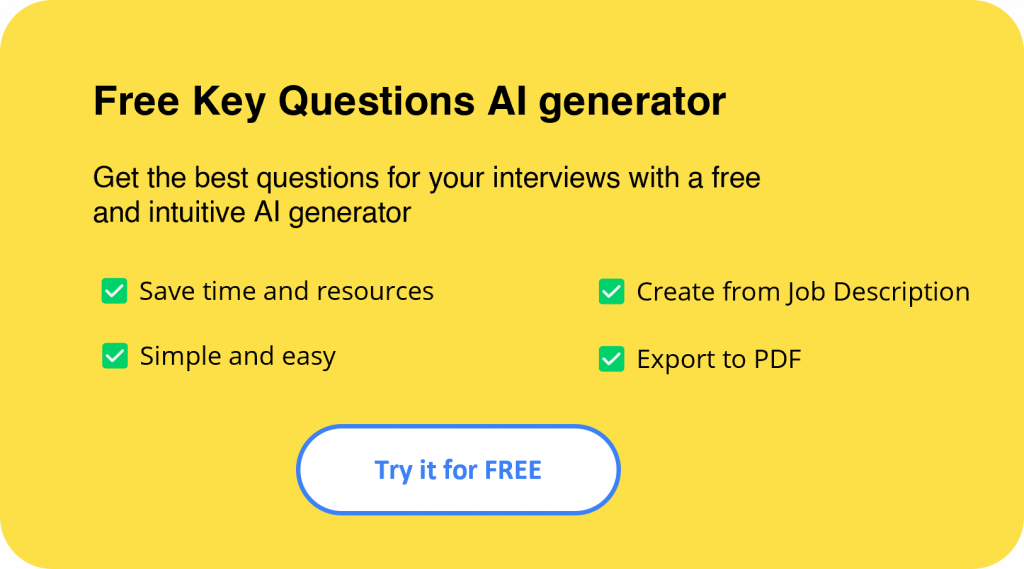Mastering behavioral interviews is a key skill that can either make or break the success of your hiring process. Let’s face it – attracting talent is becoming increasingly challenging. Tripping up at the initial screening stages poses a significant problem as it extends the time to hire. Avoiding the need to restart the process due to candidates not meeting expectations can be a daunting experience.
That’s why we aim to empower HR professionals with the tools and insights necessary to conduct impactful behavioral interviews. From crafting effective behavioral interview questions to employing best practices, including the use of cutting-edge tools like AI, we’ve got you covered.
Understanding Behavioral Interviews
Back to basics: what are behavioral interviews?
Behavioral interviews are a type of job interview that focuses on a candidate’s past behaviors and experiences as indicators of their future performance. The underlying premise is that the best predictor of future behavior is past behavior. This approach is based on the belief that how a candidate handled specific situations in the past is reflective of their abilities, skills, and suitability for the position.
In a behavioral interview, you don’t ask hypothetical or general questions. The interviewer poses inquiries that prompt the candidate to provide specific examples of situations they have encountered in previous roles. The goal is to obtain detailed responses that shed light on the candidate’s problem-solving skills. Getting interpersonal abilities and how they handle challenges or achievements are the main objective.
Key characteristics of behavioral interviews include:
- Focus on Real-World Scenarios: Questions are designed to uncover how candidates have navigated concrete situations in the past. This allows interviewers to assess the practical application of a candidate’s skills.
- Use of Specific Questions: Behavioral interview questions often begin with phrases such as “Tell me about a time when…” or “Describe a situation where…” These prompts encourage candidates to provide specific examples rather than generic responses.
- Assessment of Soft Skills: Behavioral interviews are effective in evaluating soft skills. Concepts like communication, teamwork, and problem-solving, are very relevant when candidates share real experiences that highlight these qualities.
- Consistency in Evaluation: The structured nature of behavioral interviews allows for a more consistent and objective evaluation of candidates. Interviewers can compare responses across candidates based on predefined criteria.
- Predictive Value: By examining a candidate’s past behavior, employers believe they can better predict how the candidate will handle similar situations in the future.
Sample behavioral interview questions include:
- “Can you share a specific example of a time when you had to meet a tight deadline? How did you manage it?”
- “Describe a situation where you had to resolve a conflict within your team. What steps did you take to address the issue?”
Behavioral interviews are widely used in various industries. They provide a comprehensive understanding of a candidate’s capabilities. Beyond their resume, these interviews help employers make more informed decisions when selecting the right candidate for a position.
Difference between behavioral Interviews vs Competency-Based Interviews
While the terms are often used interchangeably, it’s crucial to understand the differences. Behavioral interviews focus on actual past behavior, while competency-based interviews assess a candidate’s ability to handle future situations based on their competencies.
| Behavioral Interviews: | Competency-Based Interviews: |
|---|---|
| Focus on Past Behavior: Behavioral interviews concentrate on a candidate’s past experiences and behaviors in specific situations. Question Examples: “Tell me about a time when…” or “Describe a situation where…” | Focus on Future Capability: Competency-based interviews shift the focus towards a candidate’s ability to handle future situations based on their demonstrated competencies. Question Examples: “How would you handle a situation where…” or “Give me an example of how you would…” |
| Narrative Responses: Candidates are encouraged to provide detailed, narrative responses that outline their actions, thoughts, and outcomes in real-world scenarios. The goal is to understand how a candidate has handled situations in the past as a predictor of future behavior. | Hypothetical Scenarios: Candidates are presented with hypothetical scenarios and asked to outline how they would approach or solve the situation. The goal is to assess a candidate’s thought process, problem-solving abilities, and application of their competencies to new situations. |
| Insights into Soft Skills: Behavioral interviews aim to reveal a candidate’s soft skills, such as communication, problem-solving, adaptability, and interpersonal abilities, through their past actions. | Assessment of Skills Framework: Competency-based interviews often use a predefined framework of competencies relevant to the job. Candidates are evaluated on their alignment with these competencies. The focus is on assessing a candidate’s potential to apply their skills in future job-related situations. |
| Open-Ended Questions: Questions are often open-ended, allowing candidates to share comprehensive examples that demonstrate their skills and competencies. | Targeted Skill Evaluation: Questions are tailored to evaluate specific competencies required for the job, such as leadership, teamwork, decision-making, or communication. |
While there are differences, it’s essential to note that both types of interviews share common ground:
- Assessment of Soft Skills: Both behavioral and competency-based interviews aim to evaluate a candidate’s soft skills, providing insights into their interpersonal and problem-solving abilities.
- Structured Approach: Both interview types involve a structured approach to questioning, often using predetermined sets of questions or criteria for evaluation.
In practice, many interviews combine elements of both behavioral and competency-based approaches to gain a comprehensive understanding of a candidate’s qualifications, experiences, and future potential. Employers may use a mix of past behavior exploration and competency assessment to make informed hiring decisions.
Crafting exceptional behavioral interview questions
Key components of effective behavioral questions
- Relevance: Ensure questions are directly related to the skills and competencies required for the job.
- Specificity: Ask candidates to describe detailed scenarios rather than hypothetical situations.
- Variety: Include questions that cover various competencies and soft skills relevant to the position.
| Component | Importance | |
|---|---|---|
| Relevance to the position | The question should directly relate to the skills, competencies, and behaviors essential for success in the specific job role. | This ensures that the candidate’s response provides valuable insights into their ability to excel in the targeted position |
| Specificity and detail | Encourage candidates to share detailed and specific examples rather than offering general or hypothetical responses. | Specific examples provide a more comprehensive understanding of the candidate’s past behavior and actions, allowing for a more accurate assessment. |
| Variety in question types | Utilize a mix of question types to cover different competencies and soft skills relevant to the position. | A varied set of questions ensures a holistic evaluation, capturing various aspects of the candidate’s experiences and capabilities. |
| Behavioral indicators | Frame questions that prompt candidates to showcase behaviors indicative of important qualities, such as teamwork, problem-solving, adaptability, and leadership. | By focusing on specific behaviors, you gain insight into how candidates approach challenges and collaborate with others. |
| Alignment with company values | Ensure that the behavioral questions align with the core values and culture of the organization. | This helps assess not only the candidate’s ability to perform the job but also their compatibility with the company’s values and work environment. |
| Outcome and impact assessment | Encourage candidates to discuss the outcomes and impacts of their actions in the described scenarios | Understanding the consequences of a candidate’s behavior provides a deeper understanding of their effectiveness and contributions. |
| Open-ended nature | Frame questions in an open-ended manner, allowing candidates to provide detailed responses beyond simple “yes” or “no” answers. | Open-ended questions stimulate thoughtful responses, providing a more complete picture of the candidate’s experiences and thought processes. |
| Adaptability to different roles | Craft questions that can be adapted to various job functions and levels within the organization. | This ensures the versatility of the questions, making them applicable across different roles while maintaining relevance to each specific job. |
| Inclusion of situational challenges | Incorporate questions that delve into how candidates handled challenging situations or obstacles. | Assessing a candidate’s response to challenges provides insights into their resilience, problem-solving skills, and ability to thrive under pressure. |
| Candidate comfort and engagement | Consider the candidate’s comfort level and engagement with the questions, ensuring they feel encouraged to share their experiences. | A comfortable and engaged candidate is more likely to provide candid and authentic responses, enhancing the overall effectiveness of the interview. |
Examples of good behavioral interview questions
- Question: “Can you share a specific instance when you had to manage a project with tight deadlines? How did you prioritize tasks and ensure successful completion?”
- Rationale: This question assesses time management, prioritization skills, and the ability to handle pressure – crucial for roles requiring project management and deadline adherence.
- Question: “Describe a situation where you had to work collaboratively with a diverse team to achieve a common goal. What challenges did you face, and how did you contribute to the team’s success?”
- Rationale: This question evaluates teamwork, communication, and adaptability, providing insights into how well a candidate collaborates with others, especially in diverse environments.
- Question: “Tell me about a time when you had to resolve a conflict within your team. What approach did you take, and what was the outcome?”
- Rationale: This question explores interpersonal skills, conflict resolution, and the candidate’s ability to navigate challenges within a team setting.
- Question: “Share an experience where you had to adapt quickly to a significant change in the workplace. How did you approach the situation, and what was the result?”
- Rationale: Assessing adaptability and flexibility, this question provides insights into how a candidate handles change, a critical skill in dynamic work environments.
- Question: “Describe a time when you identified an opportunity for process improvement in your previous role. What steps did you take to implement the change, and what impact did it have?”
- Rationale: This question evaluates initiative, problem-solving, and the candidate’s ability to drive positive change within an organization, showcasing their proactive mindset.
Embracing AI to get behavioral interview questions
Embracing AI to generate behavioral interview questions based on a job description can bring several advantages, streamlining the recruitment process and enhancing its efficiency. Here’s a breakdown of the benefits and the target audience for such a tool:
Advantages of AI behavioural interviews
- Time efficiency: An AI tool can swiftly analyze a job description, identifying key skills, competencies, and responsibilities.
- Advantage: This significantly reduces the time spent by HR professionals on manual question generation.
- Customization for roles: The tool tailors questions to specific roles by recognizing the unique requirements outlined in the job description.
- Advantage: Questions are directly aligned with the expectations of the position, ensuring relevance and accuracy.
- Diversity of questions:: The AI can generate a diverse set of questions, covering various competencies and soft skills needed for the role.
- Advantage: This ensures a well-rounded assessment, providing a comprehensive understanding of the candidate’s capabilities.
- Consistency in evaluation: The tool applies a consistent framework for question generation, promoting standardized assessments.
- Advantage: Interviewers can evaluate candidates using the same criteria, fostering fairness and objectivity.
- Data-driven insights: AI tools can provide analytics and insights based on the generated questions, offering a data-driven approach to candidate evaluation.
- Advantage: HR professionals gain valuable information for decision-making and identifying trends in candidate responses.
- Increased objectivity: The AI tool generates questions based on data, reducing the potential for interviewer bias.
- Advantage: This promotes a more objective evaluation of candidates, contributing to fair and unbiased hiring practices.
Who would need it:
- HR Professionals and Recruiters:
- Why: HR professionals can benefit from the time-saving aspect of the tool, allowing them to focus on other critical aspects of recruitment.
- Small to Medium-Sized Businesses:
- Why: Smaller organizations with limited resources can leverage AI tools to streamline their hiring processes without the need for extensive manual effort.
- Companies with High Recruitment Volumes:
- Why: Organizations dealing with a high volume of job applications can use the tool to efficiently generate tailored questions for multiple positions.
- Recruitment Agencies:
- Why: Agencies handling diverse job placements can use the tool to quickly generate relevant questions for a wide array of positions.
- Companies Emphasizing Diversity and Inclusion:
- Why: AI-generated questions can be designed to ensure inclusivity and avoid biases, aligning with companies that prioritize diversity.
- Organizations Seeking Consistency in Hiring Practices:
- Why: Companies aiming for standardized interview processes can benefit from AI-generated questions to maintain consistency across hiring teams

Conclusion
Mastering behavioral interviews is an ongoing journey. It requires your full attention, staying attuned to industry trends, and embracing technological advancements. By incorporating insightful behavioral interview questions, emphasizing competencies and soft skills, HR professionals can elevate their recruitment process.
An AI tool that automatically generates behavioral interview questions based on job descriptions offers a strategic advantage in terms of time efficiency, customization, and objectivity in the recruitment process. It caters to a broad audience, particularly those looking to enhance their hiring practices through technology-driven solutions.
This comprehensive guide serves as a roadmap, empowering you to navigate the complexities of behavioral interviews with confidence, ultimately leading to the identification of the best-fit candidates for your organization’s success.





